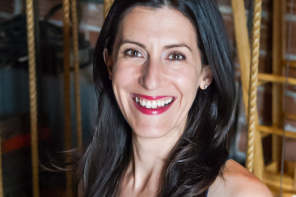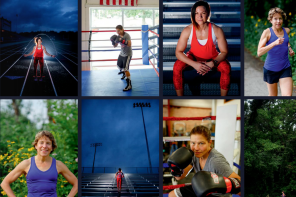IT’S JUST WHAT HEATHER MCMANAMY DOES
WITH HER DARK-CHOCOLATE EYES and cute pixie hairstyle, a smile that won’t quit, and the kind of fun-filled personality you’d want as co-pilot for a night of wine, dancing and mechanical bull rides, it’s hard to believe Heather McManamy is sick. But this 35-year-old McFarland mom is living with stage 4 metastatic breast cancer. Emphasis is on living.
Having no family history of the disease and none of the usual risk factors, McManamy is comfortable with the fact that her cancer is random. Neither religious nor superstitious, she shuns the notion that her name was inscribed in some cosmic Book of Cancer as part of a grander plan. It’s just the way the cookie crumbled.
McManamy is proof that being a survivor doesn’t always mean beating cancer. It can also mean savoring every drop of the delicious Right Now, which is all that any of us really have. As McManamy puts it, she could get eaten by a bear tomorrow. And for that matter, so could you. McManamy has a daughter Bri, nearly 4 years old, adores her husband, Jeff, and wants to stick around as long as possible. To maintain hope, she looks to emerging research, not pop advice.
“You should be eating raw organic vegetables, having kale three times a day, and doing yoga!” she jokes. “Yoga makes me violently angry.”
McManamy doesn’t seem the angry type. It’s doubtful she’d beat anyone senseless with a yoga mat. Cancer has simply dismantled her mental filter, leaving her free to be authentic. She says that’s the fabulous part, not giving a hoot what others think.
Though she can joke about it, McManamy has planned and paid for her funeral and is building an arsenal of letters and videos for Bri. This is her stage of acceptance, not resignation. McManamy points to AIDS as an example of what used to be a death sentence but can now be managed chronically. Maybe her type of cancer is next. This line-straddling way of life makes sense for “mets,” because promising medical research is always in the pipeline.
Never heard of mets? It’s shorthand for people with metastatic cancer. The term isn’t widely known in our cultural lexis, perhaps because mets don’t fit neatly within the pink-ribbon narrative. Their stories don’t culminate in a jubilant sea of pink runners’ shorts in a 5K fundraiser. Most of us would rather talk about life than death, so we avoid discussing incurable forms of breast cancer.
“I’ve heard stories of women with mets who’ve been told to leave support groups,” McManamy says, “because they’re too upsetting for other women with early-stage breast cancer. But our stories happen, too.”
In April 2013, three weeks before Bri turned 2, McManamy found a hard lump in her breast. She wasn’t even doing a self-exam, just mindlessly running her hand across her skin.
At the doctor’s office the next morning, she was told not to worry, what with her youth and clean family history. Still the tests were done with urgency: mammogram, ultrasound, biopsy. By the following morning, she was diagnosed with an aggressive form of breast cancer—grade three, out of three grades. She’d need a mastectomy and chemo, was likely to go bald, and would never have more kids.
“I couldn’t even look at old pictures of myself for a long time,” she says, “because that person was gone. You get this feeling like you’re watching someone in a horror movie, or like there’s this train coming toward them, and they don’t know it yet.”
McManamy had three months of a harsh chemo nicknamed the Red Devil, followed by three months of a milder one. (“There are buttloads of chemos!” she explains.) Both felt to her like “pregnancy on crack,” but it wasn’t 24/7 misery. There were good days and bad, good hours and bad.
“Even when it was a rough day, I had a choice. I could lie in bed and feel sorry for myself or spend time curled up with Bri reading. If she needed me, I powered through because it’s what us moms do. So, while there is a choice, I think most people would find they have the ability to do things they never thought they could because it’s what you do when life gets tough.”
Nearly a year later, McManamy was running 4 miles three times a week, fully embracing survivorship life. But with her type of cancer, new tumors are inevitable. It’s a question of when, not whether.
In August 2014, she went for an echocardiogram, because a med she takes can cause heart failure. She was a month shy of her last Herceptin treatment (a drug that interferes with cancer cell growth), so the doctor was celebratory, discussing the upcoming removal of McManamy’s port. But before McManamy got out the door, the nurse snagged her back. Something wasn’t right.
“I’ve never seen this on an echo before,” the doctor said, pointing to McManamy’s liver in the frame. The liver was visible only because imaging was done from an odd angle, to see around McManamy’s post-mastectomy breast implants. The radiologist’s note: “Multiple masses seen on right and left lobes of liver.”
McManamy would soon learn of more tumors, in her hips and spine. She was officially stage 4, where there are lots of treatments but no cure. Her prognosis: 18 to 24 months.
“Everything they do is going to stop working at some point,” she says. “Usually each treatment will work for about nine months, and then you move on to the next.”
McManamy started a drug called Xeloda in September, but recent scans indicate it might have run its course already. Mum’s the word, but her reaction might have involved crying into chicken and waffle-fries in the Chik-fil-A parking lot. That happens. She jokes about the phenomenal inspirational poster this image would make. But wouldn’t it? When we learn that inspirational women are actually ordinary folk rising to extraordinary circumstances— susceptible but resilient—there’s reason to believe we all have that power deep within us.
Being called inspirational is not really McManamy’s thing. She just wants her story to be part of the larger narrative.
“That’s my hope for this,” she says. “To [say to] someone just starting out, just dealing with this now, you have the ability to do things that you would never, ever think you could do. And it’s crazy how quickly you normalize the most unnormal things.”
McManamy now alternates living at the two poles of life, at the highest highs and the lowest lows. There’s no middle anymore, and she doesn’t miss it. She and husband Jeff openly let Bri see their roller coaster ride, so Bri knows it’s OK to be sad and that happiness returns. They answer Bri’s questions honestly, and McManamy can confirm that kids really are strong little things. Bri is doing great.
“I’ve found that the more I let myself go to that bottomed-out, sad, devastated place, the more I’m able to experience happiness and appreciation and joy that I never would have ever done before…You just see this clear realization of what’s important and what’s not, and it’s just really awesome. Just being so grateful and so appreciative of everything—of how wonderful life really is.”



